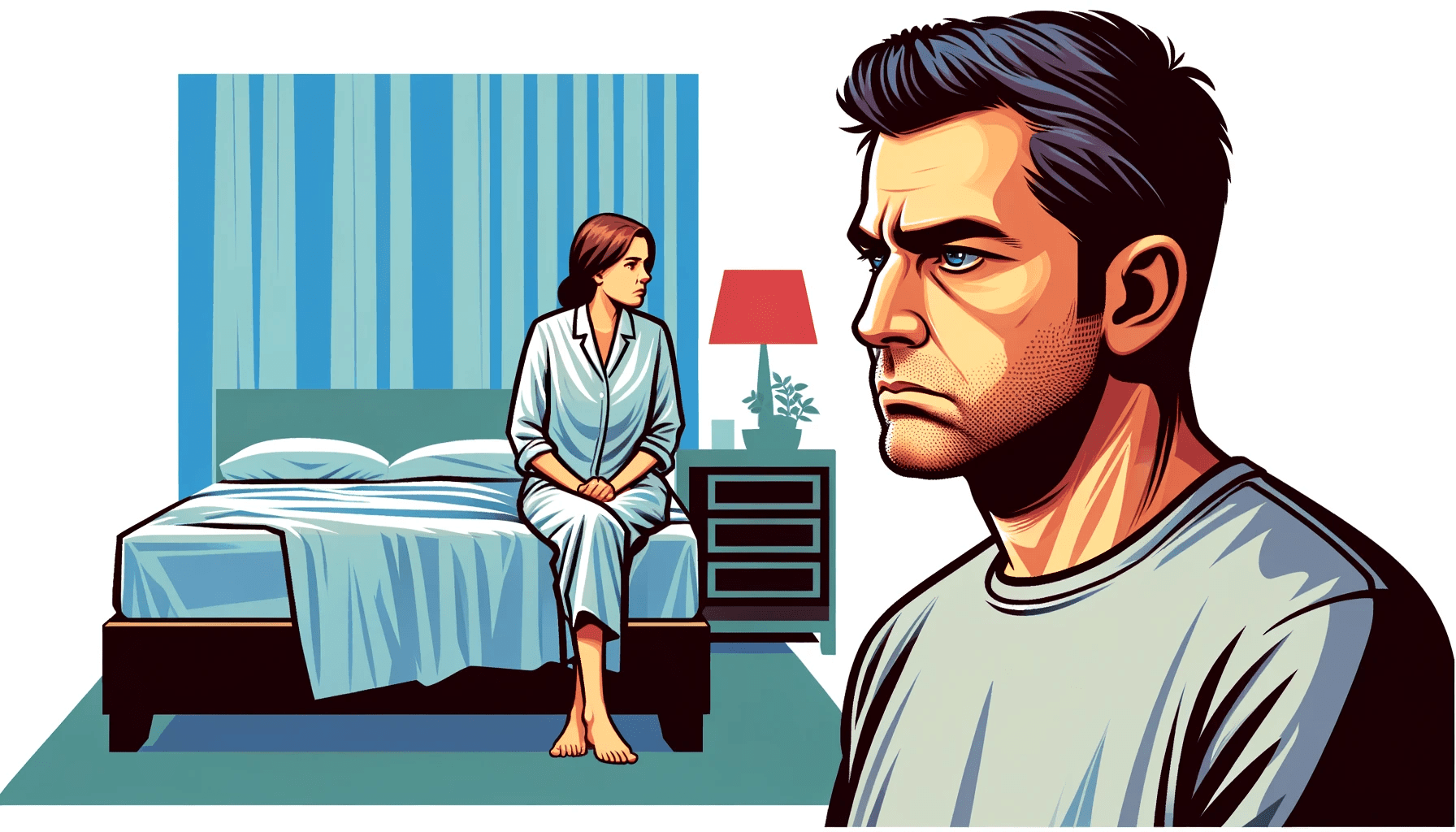Sharing is caring!
Have you ever felt a nagging sense that something’s not quite right with your husband’s behavior towards you?
It can start as a tiny inkling, a subtle shift in dynamics that you can’t quite put your finger on.
This feeling can be confusing and worrying, especially when there’s no obvious reason for the change.
It’s like walking on a slightly uneven floor – you know something’s off, but it’s hard to identify what exactly it is.
In relationships, especially marriages, it’s not uncommon for dynamics to shift over time.
But there’s a difference between the natural ups and downs of a relationship and the feeling that your husband might actually be harboring feelings of disgust towards you.
Sometimes, these feelings manifest in subtle ways – small changes in behavior, communication, or the general vibe you get from him.
These changes can be so slight that they’re easy to brush off or explain away, but deep down, you might feel that they’re signs of something more significant.
In this article, we’re going to explore some of the signs that might indicate your husband is feeling a sense of disgust or strong displeasure towards you.
It’s important to approach this topic with sensitivity and care. Recognizing these signs is the first step in addressing any underlying issues and working towards resolving them.
1. Decreased Physical Intimacy
Physical intimacy, beyond just sexual encounters, is a strong part of many marriages.
When your husband becomes less interested in physical closeness, it might hint at deeper issues.
This encompasses all forms of affection, including casual touches, hugs, and kisses, not just intimacy in the bedroom.
Physical connection ebbs and flows in any relationship, but a notable reduction in these moments can be concerning.
Observing how he reacts to your attempts at physical affection can offer insights. A reluctance to engage in these once routine gestures of love could indicate his feelings have changed.
Equally telling is the nature of your physical interactions. When hugs feel stiff or kisses lack their usual warmth, these could be signs of emotional distance creeping in.
Physical intimacy often mirrors the health of the emotional bond in a relationship.
2. Sudden Lack of Interest in Shared Plans

A sudden disinterest in future plans can be a red flag. Perhaps earlier, planning holidays or discussing future goals was something you both enjoyed.
Now, he might seem indifferent or reluctant to engage in these conversations. It’s like the excitement and anticipation that used to light up these discussions have fizzled out.
This change in attitude towards future plans can extend to simple things like weekend plans or dinner dates.
If these once joyous discussions now seem to burden him or are met with non-committal responses, it might signal a shift in his feelings.
Planning for the future is a significant part of a healthy relationship, and reluctance in this area should not be overlooked.
It’s not just the big plans; even talking about attending a friend’s wedding next month or planning a family get-together can become a point of contention.
When these topics are consistently met with a lack of enthusiasm, it’s worth considering why this shift has occurred.
3. Frequent Criticism or Negative Comments
An increase in criticism or negative comments can be a subtle yet hurtful sign.
It might start small, with comments about your cooking or the way you dress, and then escalate to more personal aspects.
It’s as if nothing you do seems good enough anymore.
Criticism, when constructive and infrequent, can be part of a healthy relationship.
However, when it becomes constant and focuses on putting you down rather than helping you grow, it’s a cause for concern. It can chip away at your self-esteem and create an environment of constant tension.
Observe the nature of his comments. Are they aimed at helping you improve, or do they seem designed to hurt?
Constant negativity, especially over trivial matters, can be a sign of deeper dissatisfaction or contempt in the relationship.
[Related: 10 Types Of Men You Should Never Marry]
4. Avoidance and Withdrawal
Consistently finding reasons to be away from home or avoiding joint activities can be a subtle sign of discomfort in the relationship.
Perhaps your husband is spending more time on hobbies that don’t include you or is frequently away for work. This behavior creates a physical and emotional gap, suggesting he might be distancing himself.
This distancing often extends to shared interests and activities. When he shows little interest in things you used to enjoy together, it’s a notable change.
Shared experiences are key to maintaining a close bond in a marriage, and a lack of enthusiasm for these can be telling.
It’s also important to note changes in social settings. If he seems more withdrawn or disinterested during outings or family gatherings, it could be a reflection of his feelings in the relationship.
While everyone has off days, consistent patterns of avoidance and withdrawal in various aspects of life together can be indicative of deeper issues.
5. Sudden Lack of Interest in Shared Plans

A sudden disinterest in future plans can be a red flag as well. For instance, planning holidays or discussing future goals was something you both enjoyed.
Now, he might seem indifferent or reluctant to engage in these conversations.
It’s like the excitement and anticipation that used to light up these discussions have fizzled out.
This change in attitude towards future plans can extend to simple things like weekend plans or dinner dates.
If these once joyous discussions now seem to burden him or are met with non-committal responses, it might signal a shift in his feelings.
Planning for the future is a significant part of a healthy relationship, and reluctance in this area should not be overlooked.
It’s not just the big plans; even talking about attending a friend’s wedding next month or planning a family get-together can become a point of contention.
When these topics are consistently met with a lack of enthusiasm, it’s worth considering why this shift has occurred.
6. Frequent Criticism or Negative Comments
An increase in criticism or negative comments can be a subtle yet hurtful sign. It might start small, with comments about your cooking or the way you dress, and then escalate to more personal aspects.
It’s as if nothing you do seems good enough anymore.
Criticism, when constructive and infrequent, can be part of a healthy relationship.
However, when it becomes constant and focuses on putting you down rather than helping you grow, it’s a cause for concern.
It can chip away at your self-esteem and create an environment of constant tension.
Observe the nature of his comments. Are they aimed at helping you improve, or do they seem designed to hurt?
Constant negativity, especially over trivial matters, can be a sign of deeper dissatisfaction and maybe disgust in the relationship.
[Interesting: The Percentage Of Marriages That Last 30 Years, According to Studies]
7. Changes in Social Behavior Around Others
Pay attention to how he behaves around others when you’re together.
If he suddenly seems more distant or less affectionate in social settings, it could be indicative of his feelings.
Maybe he used to proudly introduce you or was keen to include you in conversations, but now it feels like he’s trying to keep you at arm’s length.
This behavior can also manifest in how he talks about you to others.
If he used to speak highly of you but now either avoids mentioning you or makes dismissive comments, it’s a worrying sign.
How a partner speaks about you in your absence often reflects their true feelings.
Also, consider how he interacts with friends and family. If there’s a noticeable shift in his enthusiasm or affection when you’re around compared to when he’s with others, it might suggest that the issue lies within your relationship, not in his general social demeanor.
8. Lack of Emotional Support
Emotional support is the backbone of any marriage.
It’s not just about the big moments of crisis; it’s the everyday emotional interactions that count.
If sharing your day’s highs and lows with him now feels like talking to a wall, it might signal a disconnect.
The empathy and understanding that once defined your conversations might be replaced with indifference.
Maybe he used to be the first person you’d turn to during tough times, but now he seems disinterested or unavailable when you need support.
Consider also how he reacts to his own challenges. If he’s not turning to you for support or sharing his feelings, it suggests a withdrawal from the emotional intimacy that once bonded you.
This withdrawal can create a widening gap in your emotional connection.
9. Unexplained Irritability or Anger

You might notice he gets frustrated more easily, especially over small or insignificant things.
It’s as though his patience has shortened, and you’re on the receiving end of his irritation.
Minor annoyances that he would have brushed off before now trigger a strong reaction.
Furthermore, consider how he resolves conflicts or disagreements. If there’s an increase in hostility or an unwillingness to find a peaceful resolution, it could be reflective of deeper issues in your relationship.
Healthy conflict resolution is key to any marriage, and a breakdown in this area can signal growing resentment or dissatisfaction.
It’s important to distinguish between a bad day at work and a consistent pattern of irritability directed towards you.
10. Lack of Enthusiasm in Shared Interests
Once shared interests and hobbies might lose their appeal in his eyes. You both might have enjoyed certain activities together, but now, he seems less interested or even indifferent.
It’s like the things that used to bring you closer no longer have the same effect. This shift can leave a noticeable gap in your relationship, as shared interests often serve as a bonding factor.
His lack of enthusiasm can manifest in subtle ways. Maybe he no longer suggests or plans outings that you both used to enjoy, or he might passively participate without the zest he once had.
It’s a contrast to the excitement and engagement that used to characterize these shared moments.
11. Overly Focused on Personal Space
Everyone needs personal space, but an excessive focus on it can be a red flag.
When a man suddenly starts to emphasize his need for more alone time or personal space more than usual, it could be a sign of discomfort in the relationship.
It’s as though he’s trying to create a buffer between the two of you.
The constant need for space might manifest in him spending more time alone in a different room or showing irritation when you invade his personal space.
It’s a stark change from the closeness you used to share, where spending time together was a source of comfort, not a cause for tension.
Respecting personal space is important, but when it becomes a barrier to intimacy and connection, it’s worth exploring why this need has intensified.
It’s about finding a balance between individual space and shared togetherness, and a shift too far in one direction can indicate underlying issues.
12. Changes in Communication
You’re noticing there’s less chatter about everyday things, and conversations don’t flow as they used to.
It’s as though the usual back-and-forth banter has dwindled, leaving a noticeable void. It’s not always about long discussions; sometimes, it’s the short, meaningful exchanges that start to fade away.
Non-verbal cues play a big role too. You might notice less eye contact or a general sense of detachment in his body language.
These small changes can speak volumes. It’s like an invisible wall building up, altering the once comfortable and open dynamic you shared.
Another aspect to consider is his tone. A once warm and engaging tone turning dismissive or indifferent can be a sign of underlying issues.
There’s a difference between an occasional bad mood and a persistent change in how he interacts with you.
What To Do When You Realize Your Husband Is Disgusted By You

1. Talk to Him About What You’re Noticing
Starting a conversation about your concerns can be challenging but it’s a crucial first step.
Approach the subject gently and choose a good time when you both are calm and not distracted.
Express your feelings without blame. For example, you might say, “I’ve been feeling a bit disconnected from you lately, and I’m worried about us. Can we talk about it?”
This opens the door for dialogue without putting him on the defensive.
Listening is just as important as talking. Give him space to share his feelings and thoughts.
There might be underlying issues you’re not aware of. It’s important to approach this as a team – you’re working together to improve your relationship, not blaming each other.
Remember, effective communication is key to understanding and resolving relationship issues.
2. Seek Understanding
Try to understand his perspective. It’s possible that what you perceive as disgust might be something else entirely.
Maybe he’s going through stress at work, dealing with personal issues, or struggling with something he hasn’t communicated yet.
Understanding doesn’t mean you have to agree with everything he says, but it does mean giving him the benefit of the doubt and trying to see things from his point of view.
Sometimes, a partner’s behavior changes due to reasons that have nothing to do with you. If this is the case, finding ways to support him through his challenges can improve your relationship.
However, if his behavior is directly related to his feelings towards you, understanding the root cause is the first step to addressing it.
3. Personal Reflection
Self-reflection can also be beneficial. Consider if there have been any significant changes or stressors in your life that might be affecting your relationship.
It’s not about taking the blame but about understanding how external factors can impact marital dynamics.
Sometimes, changes in our own behavior or circumstances can unknowingly affect our partners.
Reflect on your actions and habits to see if there’s anything that might be contributing to the situation. It’s also important to consider your own needs and feelings.
Are there aspects of your relationship that you’re unhappy with?
Reflecting on these can help you communicate more effectively and work towards a happier, healthier relationship.
4. Professional Help
If the issue seems too big to handle alone, seeking professional help is a wise option.
Couples therapy can provide a safe space to explore your relationship issues with the guidance of an expert.
A therapist can help you both understand each other’s perspectives, communicate more effectively, and work through any underlying issues.
Therapy can also be a great place for individual growth. Sometimes, our personal issues can affect our relationships.
Working on these individually can have a positive impact on your marriage. Remember, there’s no shame in seeking help. It’s a sign of strength and commitment to your relationship’s health.
5. Patience and Compassion
Finally, navigating through relationship issues requires patience and compassion, both for yourself and your husband.
These issues usually don’t resolve overnight. It takes time, effort, and understanding from both sides. Be kind to yourself during this process. It’s normal to feel a range of emotions.
At the same time, extend compassion to your husband. If he’s going through a tough time, showing him empathy and understanding can make a big difference.
A relationship is a partnership, and facing challenges together, with patience and compassion, can make your bond stronger.
Every relationship has its ups and downs, and working through them is part of the journey.
(Read: 7 Signs He Wants to Breakup (Even if He isn’t Saying it)
FAQs
Can Counseling Help If My Husband Is Disgusted by Me?
Yes, counseling can be a helpful tool if your husband is showing signs of disgust or displeasure.
A professional therapist can provide a safe space for both of you to express your feelings and work through any issues.
Counseling can help in understanding each other’s perspectives, improving communication, and rebuilding the emotional connection.
It’s important to choose a therapist who’s experienced in marital counseling for the best outcomes.
Is It Normal for Feelings in a Marriage to Change Over Time?
Yes, it’s normal for feelings in a marriage to change over time. Relationships evolve, and the intense passion of the early days can settle into a more stable, deep love.
However, if the change in feelings is negative, such as feelings of disgust or strong displeasure, it’s a sign that there may be underlying issues that need to be addressed.
Regular communication and mutual effort are key to maintaining a healthy, loving relationship.
How Can I Improve My Relationship with My Husband?
Improving your relationship with your husband involves open communication, mutual understanding, and effort from both sides.
Spend quality time together, engage in activities you both enjoy, and show appreciation for each other. It’s also important to respect each other’s individuality and support each other’s goals.
Regularly expressing your love and gratitude can strengthen your bond. If there are deeper issues, consider seeking help from a counselor or therapist.
Sharing is caring!
